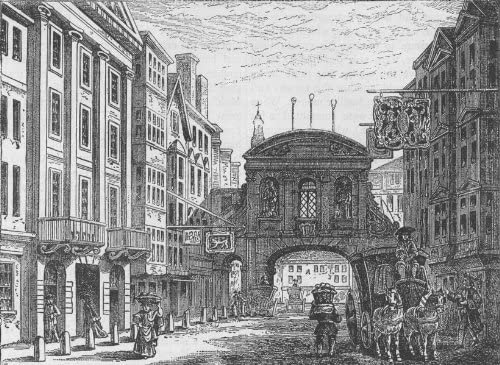Annotation:Temple Barr: Difference between revisions
No edit summary |
No edit summary |
||
| (2 intermediate revisions by the same user not shown) | |||
| Line 1: | Line 1: | ||
{{TuneAnnotation | {{TuneAnnotation | ||
|f_annotation=[[File: | |f_annotation=[[File:Templebar2.jpg|right|500px|thumb|Temple Bar and the "Devil Tavern", c. 1780.]]'''TEMPLE BARR.''' AKA and see “[[Masquerade Royal]].” English, Country Dance Tune (2/2 time). G Minor. Standard tuning (fiddle). AB. “Temple-Barr” appears in the '''Second Volume of the Dancing Master''', 3rd edition (1726, p. 187), published in London by John Young, heir to John and Henry Playford's long-running '''Dancing Master''' series of volumes. John Playford published at the Inner Temple and his (second) son, Henry, who had been assisting, left toward the end of John's life to his own establishment "at his shop near Temple Bar." | ||
<blockquote> | |||
''At the death of his father [c. 1686] Henry Playford appears to have returned to the old address as his imprints'' | |||
''give "Near the Temple Church", but in 1696 his address is altered to "near Temple Bar," or "Temple Change", or at'' | |||
''the publisher's "house in Arundel Street over against the Blew Ball." This house was probably one occupied by | |||
'' his father in his later years...''<ref>Frank Kidson, "John Playford, and 17th Century Music Publishing", '''The Musical Quarterly''', vol. 4, No. 4, Oct. 1918, p. 530. </ref> | |||
</blockquote> | |||
Young published at the Dolphin and Crown, St. Paul's Churchyard. | |||
<br> | <br> | ||
<br> | <br> | ||
London’s Temple Bar was originally built in 1670 and stood in the vicinity of Fleet Street and the Strand. It was dismantled in 1878 when Fleet Street was widened and moved to Theobalds Park in Chestnut. There has been previous gateways on the site, wooden structures, the last of which was destroyed in the Great Fire. The 1670 structure was the most elaborate, built by masons Joshua Marshall and Thomas Knight (although traditionally attributed to Sir Christopher Wren), featuring a main arch that spanned the roadway with pedestrian arches on either side. There was a central room at the top and four statues: Charles II, Queen Anne (consort of James I and formerly a princess of Denmark), James I and Charles I, all the work of John Bushnell. | London’s Temple Bar was originally built in 1670 and stood in the vicinity of Fleet Street and the Strand. It was dismantled in 1878 when Fleet Street was widened and moved to Theobalds Park in Chestnut. There has been previous gateways on the site, wooden structures, the last of which was destroyed in the Great Fire. The 1670 structure was the most elaborate, built by masons Joshua Marshall and Thomas Knight (although traditionally attributed to Sir Christopher Wren), featuring a main arch that spanned the roadway with pedestrian arches on either side. There was a central room at the top and four statues: Charles II, Queen Anne (consort of James I and formerly a princess of Denmark), James I and Charles I, all the work of John Bushnell. | ||
|f_source_for_notated_version= | |f_source_for_notated_version= | ||
|f_printed_sources= | |f_printed_sources= | ||
|f_recorded_sources=Barnes ('''English Country Dance Tunes, vol. 2'''); 2005; p. 128. Raven ('''English Country Dance Tunes'''), 1984; p. 17. | |f_recorded_sources=Barnes ('''English Country Dance Tunes, vol. 2'''); 2005; p. 128. Raven ('''English Country Dance Tunes'''), 1984; p. 17. | ||
|f_see_also_listing= | |f_see_also_listing= | ||
}} | }} | ||
Latest revision as of 23:42, 8 July 2021
X:1 T:Temple Barr M:2/2 L:1/8 K:Gmin G2A2 | B2G2B2c2 | d4 d2 cB | A2B2c2d2 | B2G2G2A2 | B2G2B2c2 | d4 d2 cB | A2G2A2^F2 | G4 || d2e2 | f2e2f2g2 | f4 f2ed | c2d2e2d2 | c4 dcde | d4c4 | B4 G2A2 | B2G2B2c2 | d4 d2 cB | A2B2c2d2 | B2G2G2A2 | B2G2B2c2 | d4 d2 cB | A2G2A2^F2 | G4 ||

At the death of his father [c. 1686] Henry Playford appears to have returned to the old address as his imprints give "Near the Temple Church", but in 1696 his address is altered to "near Temple Bar," or "Temple Change", or at the publisher's "house in Arundel Street over against the Blew Ball." This house was probably one occupied by his father in his later years...[1]
Young published at the Dolphin and Crown, St. Paul's Churchyard.
London’s Temple Bar was originally built in 1670 and stood in the vicinity of Fleet Street and the Strand. It was dismantled in 1878 when Fleet Street was widened and moved to Theobalds Park in Chestnut. There has been previous gateways on the site, wooden structures, the last of which was destroyed in the Great Fire. The 1670 structure was the most elaborate, built by masons Joshua Marshall and Thomas Knight (although traditionally attributed to Sir Christopher Wren), featuring a main arch that spanned the roadway with pedestrian arches on either side. There was a central room at the top and four statues: Charles II, Queen Anne (consort of James I and formerly a princess of Denmark), James I and Charles I, all the work of John Bushnell.
- ↑ Frank Kidson, "John Playford, and 17th Century Music Publishing", The Musical Quarterly, vol. 4, No. 4, Oct. 1918, p. 530.

